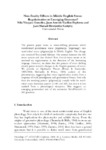Mostrar o rexistro simple do ítem
Non-finality Effects in Middle English Stress: Regularisation or Emerging Grammar?
| dc.contributor.author | Vázquez González, Nila | |
| dc.contributor.author | Cutillas Espinosa, Juan Antonio | |
| dc.contributor.author | Hernández Campoy, Juan Manuel | |
| dc.date.accessioned | 2016-07-15T08:35:36Z | |
| dc.date.available | 2016-07-15T08:35:36Z | |
| dc.date.issued | 2008 | |
| dc.identifier.citation | AEDEAN 2008, 31: 911-922 ISBN-978-84-9749-278-2 | |
| dc.identifier.isbn | 978-84-9749-278-2 | |
| dc.identifier.uri | http://hdl.handle.net/2183/17104 | |
| dc.description.abstract | [Abstract] The present paper looks at stress-shifting processes which transformed penultimate stress (pilgrimá:Ze, ‘pilgrimage’) into word-initial stress (pílgrima(:)Z) in Middle English. The change also involved final-vowel deletion. The contact between the ME stress system and that derived from French loans seems to be resolved via regularisation in the direction of the borrowing language. However, we claim that this process of stress shifting already points towards changes in the English grammar of stress. We provide an Optimality Theory (Prince & Smolensky, 1993/2004; McCarthy & Prince, 1993) analysis of this phenomenon, suggesting that stress regularisation results from a conspiracy of both paradigmatic and grammatical forces. Not only does the resulting pattern (pílgrima(:)Z) comply with the wordinitial stress dominant pattern in OE and ME, but also it is less marked from a phonological viewpoint. This suggests an emerging grammatical role of the constraint NONFINALITY in ME grammar. | |
| dc.language.iso | eng | |
| dc.publisher | Universidade da Coruña | |
| dc.title | Non-finality Effects in Middle English Stress: Regularisation or Emerging Grammar? | |
| dc.type | info:eu-repo/semantics/conferenceObject | |
| dc.rights.access | info:eu-repo/semantics/openAccess |






